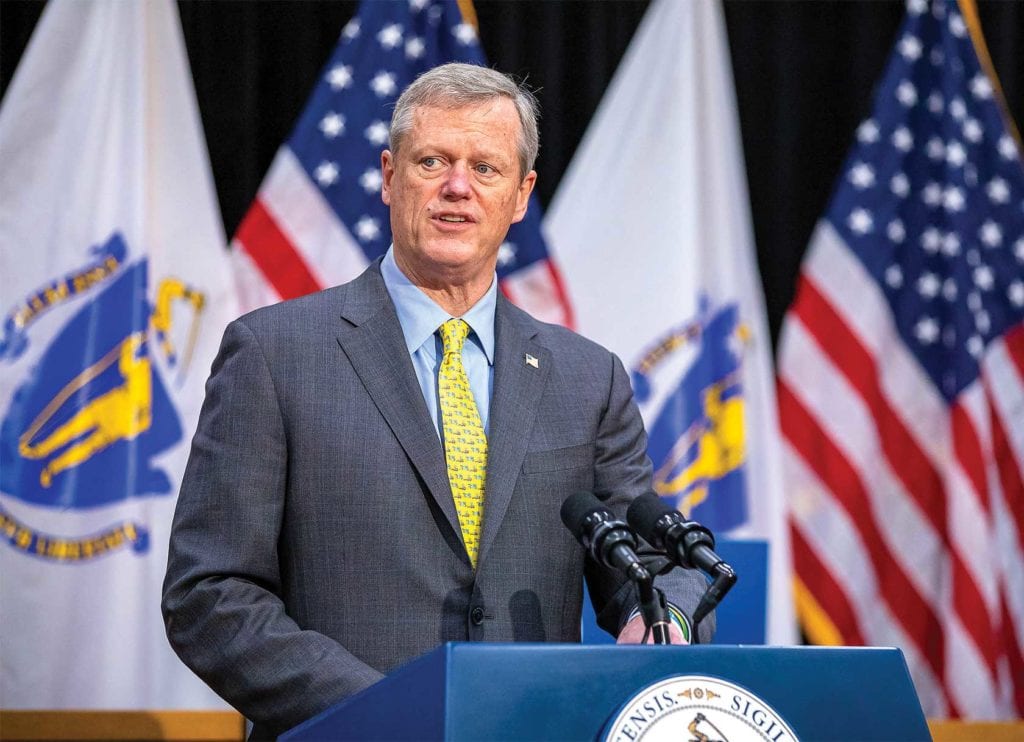Baker blocking police reform bill
Cites opposition to facial recognition ban, draws fire from black electeds

Groups of elected officials and organization leaders are publicly criticizing the governor’s amendments to the police accountability bill. Instead of signing the bill as expected, he has fought back on its facial recognition ban and new Peace Officer Standards and Training Commission.
On Dec. 11, a public “Statement by Electeds and Leaders of Color” was written on his amendments.
“We are disappointed that the Governor chose to blink and potentially stand on the wrong side of history. What we needed in this moment of reckoning was steely-eyed, brave allyship. The Governor could have provided that by signing the bill and filing concurrent new legislation with the changes he’d like, as he has done with past conference committee bills,” they wrote.
“Instead, we got amendments that serve to ignore through delay the very people and communities most impacted and harmed by the police.” The letter is signed by elected officials and activists including Suffolk County District Attorney Rachel Rollins, Congresswoman Ayanna Pressley, State Rep. Russell Holmes, ACLU Massachusetts Racial Justice Program Director Rahsaan Hall.
The governor returned the bill to the Legislature with his amendments last Thursday, stating that he does not agree with a full ban on facial recognition technology.
“The restrictions on the technology, with only significantly limited exceptions for law enforcement, ignores the important role it can play in solving crime,” Baker wrote.
The bill also moves the Municipal Police Training Committee underneath the jurisdiction of the new POST Commission. Baker disagrees with the move because of the commission’s majority-civilian makeup. “I do not accept the premise that civilians know how to best train police,” he wrote.
“My amendment proposes to restore the Municipal Police Training Committee to its current location and responsibilities.” The Municipal Police Training Committee currently resides under the Executive Office of Public Safety and Security, while the POST Commission would be separate.
The Commission would have the power to certify and decertify officers based on their performance and investigations into their behavior. Officers who are decertified would be barred from working in law enforcement and will lose some of their protections under qualified immunity. The bill also limits no-knock warrants, an amendment in response to the killing of Breonna Taylor in Louisville, Kentucky.
Baker also asked that there be a seat on the commission designated for “labor representation,” and that all sections of the bill that require organizational changes to establish the POST commission begin July 1, 2021 to give the administration enough time to carry it out.
In addition to his comments on facial recognition technology, which was banned in the bill because of evidence that it is biased against people of color, Baker asked for a clearer definition of “bias-free policing” in the legislation.
A coalition of elected officials of color from cities and towns across the state wrote a collective letter rejecting the amendments.
“The use of facial recognition technology by law enforcement has already been banned in cities, like Boston and Springfield, and this step must be implemented statewide. Furthermore, a civilian-led oversight commission would bring community perspective and represent the interests of those being ‘policed,’’ they wrote. This letter was signed by six of Boston’s 13 city councilors.
Governor Baker filed a police accountability bill in January that focused on creating a commission but did not include some of the initiatives proposed in the Legislature’s bill. The governor’s office, in a statement to the Banner, said the governor supports almost every section of the legislature’s version.
“He amended sections dealing with facial recognition and training — sections that do not affect the administration’s and Legislature’s common goal: creating accountability for all law enforcement in the wake of too many tragedies against people of color,” said press secretary Sarah Finlaw.
The governor will not support a final package that doesn’t include his amendments.






